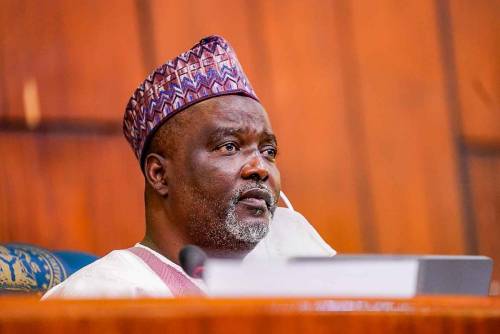
Insecurity: Nigerians in Diaspora Can’t Participate in Nigeria Affairs —Deputy Speaker
The Deputy Speaker of the House of Representatives, Idris Wase, says Nigerians in the Diaspora have no right sending petitions to the House on issues happening in Nigeria. He rejected the petition on the ground that these people don’t live in Nigeria.
Wase, who represents Wase Federal Constituency, Plateau State, said this at a plenary while sitting in for the Speaker, Femi Gbajabiamila.
He also said Nigerians who sit in their comfort zones abroad are not eligible to file petitions against the Federal Government on issues regarding insecurity.
Wase said this when a lawmaker, Mark Gbillah, representing Gwer East-Gwer West constituency of Benue State, attempted to submit a petition filed by Mzough U Tiv America (MUTA) on insecurity in Benue, Nasarawa, and Taraba.
The petition was filed against the Federal Government with regards to their ancestral land which seems to have been possessed through various attacks.
Hon Gbillah, a member of the opposition Peoples Democratic Party, had explained that he was submitting the petition on behalf of MUTA because indigenes of the affected states had been sacked from their ancestral lands.
Before he could speak further, Wase, who is of the ruling All Progressives Congress, said, “Honourable Gbillah, did you say Tivs in America? What do they know about Nigeria? Do they know exactly what is going on in Nigeria?
Hon Gbillah Countered the Statement saying “They do, they have their family members and people there”
The Deputy Speaker argued that Nigerians abroad have no rights to file a petition on the crisis, stating that it would be understandable “if this petition is coming from those who are within the country.”
In response, Gbillah argued that Nigerians abroad should be able to file complaints because they are citizens who still have their Nigerian Passport.
Wase quickly countered by asking if MUTA was duly registered with the Corporate Affairs Commission.
But Gbillah responded by saying Section 40 of the constitution does not stop citizens from freedom of association.
Gbillah argued that Nigeria had been pursuing a policy of inclusiveness for its citizens in the Diaspora, an aim that would easily be defeated if the same category of Nigerians cannot be allowed to speak on raging matters of national concern.
“I’ll refer you to the functions of the committee on Diaspora, if you go through that, it is nothing relevant to what you’re now presenting, I’m not convinced that we have to take that petition,” Mr. Wase said.
Gbillah’s petition was subsequently rejected without any opposition from any member in the chamber.
However, the video of the incident has begun attracting comments on social media with many lambasting Wase and arguing that Nigeria cannot appeal to its Diaspora to remit billions home but still be denied a voice at home.
A former Chairman, National Human Rights Commission, Prof. Chidi Odinkalu, said on Twitter, “So, the House of Representatives can so blithely strip Nigerians outside the borders of the country of their citizenship and rights?
“Is it ignorance or bias or biased ignorance that drives this presiding officer in this piece of inspired parliamentary silliness?
“The same ninnies who pull this kind of nonsense habitually will show up tomorrow and tell you how Nigeria’s unity is not negotiable when they themselves have made it a tradable commodity and have made good bartering it for convenience all their lives, even in parliament.”
Osarenkhoe Brown also tweeted, “Cows in Diaspora are citizens of Nigeria wherever they are and wherever they come from.
Ancestral children of Nigeria living in Diaspora communities are not citizens of Nigeria. Consequently, if you are not a herdsman or have cows and live outside Nigeria, you have lost citizenship.”
@ADUTUK tweeted, “And the CBN and Nigerian government are here begging for their dollars but don’t want to hear their petition, just crazy, double standards everywhere, Shame on you and your assembly.”
Such a pity, the parliament has again failed the citizens of Nigeria. The country can check Nigerians in Diaspora but they can’t check the leaders. Democracy in Nigeria is shattered.

